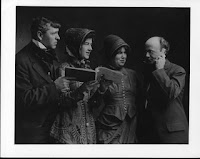There were lots of musical and food-related Kenyan firsts
for me this past week.
I performed for the first time with the Nairobi Music
Society choir in their Christmas concert inside All Saints Anglican Cathedral
of Nairobi last week end. I was even given a solo and shared the spotlight with
three other local singers in a Renaissance quartet. Because the choir and
orchestra were already taking up all the space between the elevated Cathedral
choir and the audience in the naive, all four soloists were asked to squeeze
into the elevated pulpit. It was a snug fit.
On Saturday night I went to see my first Kenyan musical at the
National Theatre. ‘Seventeen’ was a show about a class of high school teenagers
with a Dr Jekyll-&-Mr Hyde-type girl in the leading role. The lyrics were
intelligent, the tunes catchy and arrangements groovy. The strings in the small
live orchestra could have done with further tuning practice, but overall, it
was a commendable musical performance composed and produced by the staff and
students of the Kenya Conservatoire of Music.
I baked my first batch of pastry from my new oven in my
apartment. Because I am still waiting for my furniture and cooking utensils to
arrive from Paris, all I had were the two sauce trays provided with the oven.
So I baked butter biscuits and shared them with colleagues. I am glad to report
that the oven is working fine.
I went to the Agha Khan University Hospital on Wednesday to
see a doctor. The hospital is supposed to be the best in town; it is definitely
not as glitzy as the hospitals I had been to in Bangkok but the staff were competent
and I got all the medication I wanted for the small ailments I had. What is the
link here with music and food? It was Jamhuri Day, the national day of Kenya.
So the television in the waiting room was broadcasting a special programme of
whole-day national community-building songs performed by various choirs in
different locations of the country. I had a very musical, although rather long,
wait to see the doctor. Food: I was given a deworming treatment for my high
white blood cell count. Probably some parasite I got because of eating too many good
things in other exotic places…
The first time ever I saw your face
Johnny Cash, The man comes around, Universal Mercury records


























